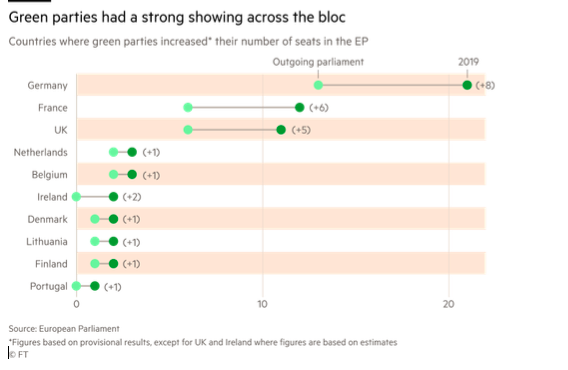
New EU parliament’s economic composition – the Greens
Economy 3 June 2019The latest European elections for the EU Parliament occurred between May 23 and 26 measuring the historic turnout of the European electorate body. The composition of the EU Parliament has never been so diverse as of the outcomes in its 2019 elections! With the 179 (EPP) and 153 seats (S&D), ALDE was placed as the third runner up with 105 seats. While ENF won 58 seats, the ECR got 63 places. It is very interesting that the Greens managed to win 69 places which was a historic success.
What’s in stake with the new economic political provenience of the EU Parliament composition? How shall it develop and guide the overall EU economic and monetary policy? What impact will the new Commission manage to achieve?
The European Parliament is the only legislative body in the world whose decisions have direct legal effect in multiple sovereign nations. The European Parliament is a directly elected EU legislature with supervisory and budgetary responsibilities as well as its role as the locus of democratic debate on EU-level issues and action. The European Parliament has powers over important decisions such as how public money is spent through the European Union’s common budget and how the European Single Market is regulated.Greens are very interesting group and positive surprise of these elections. According to their official stance towards economic affairs, Europe has the chance of becoming a global leader in the just transition to a carbon-neutral circular economy through a Green New Deal, overcoming the austerity paradigm and ensuring economic development that benefits all.
This promises good work and decent jobs, sustainability, social inclusiveness, improved crisis resilience and stability. They want to do that in partnership with economic actors, employees, unions and businesses in order to promote economic security and thus call for an effective and independent EU authority to supervise the digital sector in order to control and limit the market power of big corporations. According to Greens, Europe needs a common sustainable industrial policy. They appeal for the greening of manufacturing and for Greening finance but oppose greenwashing. The development of adequate infrastructure has to be a high priority; emphasis must be put on research and eco-innovation. The development of digital technology and clean technology shall go hand in hand, guided by societal needs and by the international community’s Sustainable Development Goals. Industrial (de-)regulation and trade agreements must not be allowed to undermine or stand in the way of environmental and social progress, in their views.
Today, one in four people in Europe live at risk of poverty and social exclusion – including 25 million children. When Europe as a whole is wealthier than ever before, everybody deserves a decent standard of living. Reducing poverty and tackling inequalities must be a cornerstone of all economic and social policies. Greens reject austerity measures that have resulted in increasing poverty and deteriorating public services. To make the European Pillar of Social Rights a reality, they intend to appeal for introducing European legislation to secure adequate minimum income schemes in all European countries. This adequate level of social support would be provided by Member States to all people without other sources of income, taking the local living standards and differences in national systems into account and aiming at equivalent protection to all citizens. Existing standards cannot be lowered. Europe needs to secure for everyone essential social rights, such as access to healthcare, housing and education. Public investments in social, affordable and energy-efficient housing should be supported with European funds. Greens will take a European approach towards public housing policy and protect those who rent properties from exploitation.

According to Bloomberg, on fiscal policy and other aspects of economic integration, the Union faces a dilemma. Thanks to Euro, effective demand management requires “more Europe” but “more EUrope” is exactly what many supporters of populist politics object to. The answer is to strive for highly targeted policy integration where it would be vital for EU’s well being. What role will the Greens take remains to be seen yet, but they will surely have more potential and political capacity to influence the supranational decision making process.


